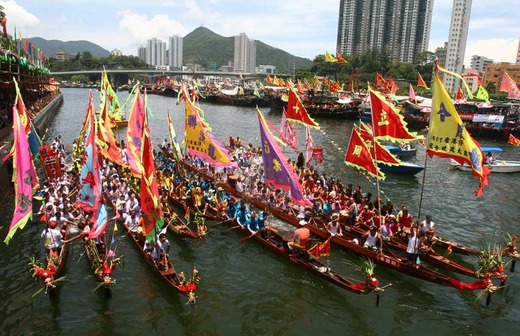Dragon Boat Festival
The Dragon Boat Festival has come and gone with little fanfare and a three-day weekend. The Dragon Boat Festival is one of the lesser Chinese holidays. Like many traditional Chinese holidays, it’s date is determined by the lunar calendar. This festival “occurs on the 5th day of the 5th month of the traditional Chinese calendar.” Thanks Wikipedia.
The short version is that minister Qu Yuan (c. 340–278 BC) committed suicide after the dynasty he was loyal to was conquered. Having no dynasty to sever he had no reason to live and drowned himself. As such, he has become a figure of loyalty and piety.
This origin story or myth serves to explain the two main traditions of the Dragon Boat Festival:
- Racing in paddle-driven longboats carved like long dragons to imitate the people as they raced out to pull Qu Yuan from the water.
- The bamboo-leaf wrapped rice balls in memory of the rice used to feed the fish in an attempt to distract the fish from eating Qu Yuan dead body. Rice balls suddenly got gruesome.
 Nowadays, though, what this holiday means to the people of China varies as drastically as the cultures of this country with varying origin stories and traditions. Where I live in Gansu, the rice balls, or 粽子 (zongzi), often lack stuffing and are instead topped with honey. While this is the most traditional way according to locals, many also enjoy their zongzi stuffed with red dates or red bean paste. While both fillings are good, I find the red bean paste is often too sweet for me while the adding red dates means there is a pit lurking in my rice ball. I prefer the plain ones topped with a heaping portion of honey. I can control how sweet it gets and the honey also adds liquid to the very sticky rice. Similarly, while I was in northeastern China near Beijing, I also found Zongzi stuffed with other fruits like pineapple.
Nowadays, though, what this holiday means to the people of China varies as drastically as the cultures of this country with varying origin stories and traditions. Where I live in Gansu, the rice balls, or 粽子 (zongzi), often lack stuffing and are instead topped with honey. While this is the most traditional way according to locals, many also enjoy their zongzi stuffed with red dates or red bean paste. While both fillings are good, I find the red bean paste is often too sweet for me while the adding red dates means there is a pit lurking in my rice ball. I prefer the plain ones topped with a heaping portion of honey. I can control how sweet it gets and the honey also adds liquid to the very sticky rice. Similarly, while I was in northeastern China near Beijing, I also found Zongzi stuffed with other fruits like pineapple.
In southern and southeastern China, zongzi take on a whole new varied life. Instead of the sweet fillings and toppings, they are cooked with savory meat fillings. Most common is pork. Everyone that has tried the meat-based savory zongzi seems to prefer them to the sweet ones more common to the north.
 For many people, the excitement of the Dragon Boat Festival lies in the dragon boat races. Teams are formed in cities all over the country and then race locally. While there are a few professional rings, the most common seem to be just-for-fun amateur races. One of my fellow Peace Corps volunteers was invited by his school to join his cities dragon boat racing team. This didn’t involve practice or training. Instead, one day they all got together, hopped in the boat, and paddled to rhythm.
For many people, the excitement of the Dragon Boat Festival lies in the dragon boat races. Teams are formed in cities all over the country and then race locally. While there are a few professional rings, the most common seem to be just-for-fun amateur races. One of my fellow Peace Corps volunteers was invited by his school to join his cities dragon boat racing team. This didn’t involve practice or training. Instead, one day they all got together, hopped in the boat, and paddled to rhythm.
Here in Tianshui, Gansu there is one more tradition that I have heard of. My host father here explained to me that on the morning of the Dragon Boat Festival, locals will climb to the top of a mountain early in the morning and drink some morning dew from the leaves. I'm not to certain on the details as my host dad was speaking quickly. Fortunately, his daughter had some questions about the traditions so I was able to get more from her than him. She was confused about how to get the dew from the leaf to your mouth. Answer: put it on your hand and lick it. A little bit is enough. Like many traditions in China, this will bring you fortune and good luck.
A small cultural aside, in contrast to the flying, fire-breathing dragons many Americans think of, dragons in China are water living creatures. Traditional Daoist rituals involved praying to the dragon of the well for rain. In the Chinese classic Journey to the West, the Monkey King (Sun Wukong) visits the underwater kingdoms of various dragons and must even fight one when crossing a river.





Comments
Post a Comment